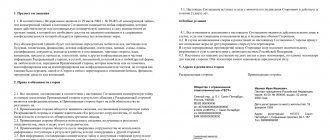How to refuse a job correctly
It happens that you didn’t like the work, but it’s awkward to immediately say “no” and disappoint expectations. You can refuse the offer if you realized during the interview that the job is not suitable.
Don't rush to agree to the offer, take time to think. A hasty decision will be based on emotions; they are not the best advisor. When the emotions subside, you will be able to more clearly imagine the positive and negative sides of the proposal. Perhaps an impulsive decision made immediately after the interview will be later revised.
You can refuse a vacancy in different ways.
- Visit the organization in person.
- Make a phone call.
- Write a refusal of the vacancy to the employer. The letter can be brought to the secretary or sent by email.
If the decision to refuse the employer after the interview has been made, then you should not delay the answer, no matter how awkward it may be.
There is no need to wait for the employer to call or leave the call unanswered. Moreover, agree to an interview if you are not going to go there.
It is better to refuse if an interview or meeting is scheduled in advance: the interviewer will have time to change the work schedule.
The time lost for a correct refusal negatively affects the reputation of the applicant. An employer who waits in vain for a specialist wastes time, the workplace remains unfilled, this negatively affects the volume of production and services.
Refusal form
If you are still convinced that there is no turning back and you need to refuse, choose a way to do this. In some cases, a letter sent by email may be sufficient. Sometimes you can just make a phone call. But most often, when the interview has already been completed, the best option remains a personal meeting and an open conversation face to face.
In writing
It is appropriate to refuse a letter in the following cases:
- if the position is not managerial or significant;
- if the employer has a quick-tempered, unbalanced character, is rude and unrestrained in communicating with others;
- if you are an introvert and find it easier to communicate with people in writing;
- if before the interview or after it there was active correspondence by mail with the employer;
- if you took a creative job related to writing.
When drawing up a written refusal:
- make sure that there are no errors in the letter;
- double-check your email address;
- set it in the settings so that you receive a notification that the letter has been received and read.
An example of how to correctly refuse in the form of a letter:
“Hello, Ivan Petrovich! Thank you for choosing me for the position of head of the sales department. It was a pleasure to meet your company. It is immediately obvious that your team is united and friendly. It is undoubtedly a pleasure to work with such people in such an atmosphere. However, I have to inform you that at the moment I am not ready to accept your offer. I got promoted at my current job, so I decided to stay here. I apologize that this is how things turned out. Sincerely, Maria Vasilievna Antipova."
By phone
It is acceptable to refuse by telephone in the following cases:
- after an interview by phone or Skype;
- if you are not resigning from a leadership position;
- if you do not have time or opportunity for a personal meeting (you must definitely mention this during the conversation, apologizing).
Disadvantage of refusing by phone: there is a risk of calling at the wrong time, especially since all bosses are extremely busy people. Therefore, first ask if it is comfortable to talk.
A personal meeting
On the one hand, this is a stressful situation for most. Not everyone can refuse an employer after an interview. On the other hand, this inspires respect, as it shows a person’s willingness to bear responsibility for the decisions made.
Therefore, psychologists advise refusing precisely at a personal meeting. However, you shouldn’t do this if just thinking about it makes your legs give way and your tongue goes numb. If you have a low level of stress tolerance, it is better to write a letter. There is also no need to go to an employer who is unstable and may react inadequately to your decision.
Adviсe
- Be prepared to be asked about the reason for the refusal.
- Find arguments in case of persuasion if you firmly decide to refuse.
- Do not complain to the employer that the proposed conditions are not worthy of attention. There is no need to try to arouse pity or refuse the vacancy too energetically. Try to correctly express your position on refusing the job offer. Take your time to say what you think. Avoid saying: “Work for such pennies yourself.” It is likely that even if the employer's representative does not try to refute the arguments, the meeting will leave an unpleasant aftertaste. The world of professionals is narrow. You may have to apply to this organization in search of work in the future.
- Be restrained, friendly, correct.
- Pull yourself together, don't panic. No need for long-winded phrases. It’s better to come up with a short, succinct formulation explaining the reason: you’re not happy with the work schedule, they’ve offered you a vacancy with higher pay.
- Don't worry about the answer being "no." You are not the only candidate for the vacancy. You have the right to choose the location that suits you.
- Try to be honest and open if the situation allows it. Thanks to your honesty, the employer will be able to draw the right conclusions and, if necessary, make adjustments to their actions.
P.S
Now you know how to refuse a job after an interview. Make every effort to make a strong argument while remaining polite. All of the above recommendations will help you in this difficult task.
The most important points of refusal are tact, politeness and restraint. Don't forget about it! By following all the rules, you can avoid offending a person and at the same time correctly explain to him why you made such a decision.
Do not lie! Use lies only when absolutely necessary.
Polite refusal of a job offer, general rules
Your task: to leave a favorable impression!
The easiest way is to refuse the interview. First of all, you need to thank them for the invitation. Secondly, briefly explain the reason for the refusal, express regret, and wish to find a suitable specialist. This can be done by phone or by sending an email.
The situation is completely different if the employer carried out a complex selection, rejected other specialists, and chose you. Moreover, if the applicant has already agreed, gone through the necessary registration procedure, and is preparing to go to work.
- Questions you should and should not ask an employer during an interview
At this stage, it is better to refuse over the phone or in person. The algorithm is the same, but there are some peculiarities. Notify the interviewer. Inform the HR staff who took part in the selection of candidates, or the hiring agency, if you contacted one.
You need to thank them for your time and explain your decision in more detail. For example: you were offered a similar job with a higher salary because your previous job offered you a promotion. Express your regret. If you let someone down, apologize for the inconvenience caused. Finally, wish your search to be successful.
Good reasons
- You were given consent to be admitted to another organization while a decision was being made in this one.
- You are not satisfied with the proposed salary. Be prepared, if you seriously interest the employer, that they will offer you more pay.
- After passing the interview, you realized that your existing work experience is not enough to perform the duties of the proposed position.
- Working conditions are not suitable: shift schedule, frequent business trips are not suitable, work involves physically difficult work, etc.
- There are no prospects for career growth.
- You have been offered a job with better conditions.
- You cannot work beyond the established hours, for example, because of a small child.
- There is an urgent need to care for a sick relative.
- Transfer of a spouse to another city or village.
You shouldn’t voice that you didn’t like the manager you’re going to work with. The organization's employees work for pennies. The amount of work performed by workers is too large. The organization's office and employees have an unattractive appearance. Be fair to those who remain. You should not spread the word among your friends: you risk getting into an awkward situation if the interlocutor turns out to be familiar with representatives of the company where you refused to apply for a job.
There is no need to voice the reason directly if they offer you a salary in an envelope, the work involves gray schemes, violation of the law, or the organization is threatened with financial collapse.
How not to give up work
You now know how to refuse an employer a job after an interview. Now you need to familiarize yourself with what you definitely should not say:
- you don’t like the employees and place of work;
- you are not satisfied with the salary, and you do not understand how people can work for such pittance.
Important! There is no need to transmit the refusal through third parties. This is your personal matter, and you yourself must gather your strength and refuse the employer. You will only make things worse if, for example, the manager finds out about your reluctance to work from some employee.
It’s also worth mentioning that if you didn’t like the way one of the employees looked or the office struck you with its poor condition, you shouldn’t shout about it at every corner. Even relatives and friends don’t need to know about this.
The whole point here is that one of your acquaintances may turn out to be, for example, a relative of that same leader, and you will end up in a very unpleasant situation. Moreover, this state of affairs may lead to you being rejected from other companies, since company leaders communicate with each other very often.
How to Opt Out of an Email Interview
The letter is great when the position is not very significant in the structure of the organization, and it was not possible to establish a friendly relationship with the person who conducted the interview. Refusal in writing eliminates the need to answer awkward questions. Of course, the letter must be correctly composed.
Example letter
Dear Nikolai Alexandrovich!
Thank you for the offer to fill the vacancy of an economist. Unfortunately, I will not be able to accept the offer due to the fact that I was offered a promotion at my current position, and I decided to accept it. I hope to cooperate in the future. I wish to find a suitable candidate.
Sincerely,
Vasilyeva Ekaterina Mikhailovna
When sending an email, be careful when typing the email address. If the organization does not receive the letter, you risk being seen as irresponsible.
The optimal time to refuse after an interview
Sometimes it is important to know not only how to refuse a job after an interview, but also when it is better to do it. Situations can turn out differently, for example:
- The decision to refuse came immediately after the interview. In this case, it is better to quickly contact the recruiter and bring him up to date. Even if the employer’s verdict is still unknown, this will help save him time and not rely on the employee in vain;
- the refusal became obvious after the positive decision on the candidacy. If the applicant has confirmed his return to work, but plans have changed, he must notify about this as quickly as possible. This will help the employer adjust the situation and offer the job to another candidate.
Even in the most awkward situation, you should honestly state your decision. The company must be notified of the refusal as quickly as possible.
How to tactfully refuse an employer after an interview
Tactfully does not mean making up excuses, but you should not answer rudely either.
It is important for you to smooth out negative aspects at this stage. In the future, it may turn out that you will have to come back for an interview with this company. Such grievances are not forgotten, especially if they concern someone’s personality. With thoughtless actions, you are digging a hole for yourself.
A detailed diagram with examples of how to refuse an employer after an interview, or before going to work for the first time, includes the following steps.
Greetings and your introduction
Be sure to remind them who you are and how you are connected to this company. This is not just a way to get rid of the employer’s forgetfulness, but also basic politeness.
Example:
“Good afternoon, N! I am Ivan Ivanov. Yesterday/a week ago I had an interview at your company for position K.”
Let them know that you are pleased with the interest shown in your person
This is a very important point. It allows you to gently prepare the employer for a subsequent refusal.
Example:
“Given how busy you are, I’m glad you took the time to tell me.”
Compliment the company
You need to be careful here. Don’t go too far: don’t be effusive in gratitude, because it will take a lot of time. Be concise and easy to understand. Your speech must be delivered correctly.
Examples:
- “Your company is an example of a close-knit team, thanks to whose efforts even the most complex financial problems are easily resolved”;
- “When communicating with you, I got acquainted with the valuable opinion of a person who is in this business for a reason. You gave me a lot of useful ideas, and in such a short period of time you still managed to convey life experience”;
- “It was interesting communicating with you/the interviewer/employees. I felt a friendly atmosphere. The people who work for this company are clearly in the right place and I'm very happy to get to know them.”
Tell me that it was difficult for you to decide to take such a responsible step - refusing a position
Try not to make your speech sound false. If you overdo it, you will look like a deceiver whose words you don’t want to listen to.
Example:
“I was forced to think for a long time before I decided to inform you of the refusal. This is a very serious step for me."
Be sure to indicate what caused the refusal
As in the previous paragraphs, the meaning of this is politeness and tact. The employer needs to know that you are not just running away from your position.
Examples:
- “The office is far from my home. I’m not willing to spend two hours getting there and then spend the same amount of time getting home”;
- “Financial conditions are not interesting enough for me”;
- “I received an offer from another company, which is currently a higher priority for me”;
- “For me to accept this vacancy, the N factor is not enough. I need time to get my bearings, and for now I am not ready to take this position”;
- “I understand that my experience is not enough to adequately represent your company in this position.”
Wish the company success
The best way to end a refusal is to wish success and rapid professional growth to the company’s employees.
Example:
“I wish to find a suitable employee for this position/position N as soon as possible. I am sure that your company will continue to develop/grow.”
If you decide to refuse the position immediately after you passed the interview (that is, you did not even have time to leave the office), then you need to slightly adjust the refusal plan.
The refusal plan right at the interview will sound like this:
- A brief compliment to the company (no more than one sentence, highlight the main points).
- Gratitude for your attention.
- Rejection reason. (“I’m sorry to say this, but I have to resign from this position because...”).
- We wish to find a suitable employee for this vacancy as soon as possible.
Why is it important to refuse tactfully?
When looking for a new job in modern conditions, specialists send their resumes to several organizations simultaneously. With this approach, it often becomes necessary to refuse the offered position.
However, not everyone knows how to politely refuse an offered vacancy and comply with the requirements of business etiquette. Meanwhile, this is a very important skill that is directly related to a person’s qualifications and professionalism.
A polite and tactful refusal will characterize you as a good specialist who has full business communication skills. Remember that the world filled with information technology is a very small place. You talk rudely to a representative of one organization, he will share his opinion about you with representatives of other companies and you will gain a reputation as a rude person.
To avoid awkward situations and not spoil your own image in the business environment, let’s take a closer look at how to politely refuse an employer and explain the reasons for loss of interest in work, while observing all the rules of professional etiquette.
The ability to politely refuse an employer is a very important skill that is directly related to a person’s qualifications and professionalism.
Mistakes to Avoid When Rejecting
Sometimes applicants who want to refuse employment make the following mistakes:
ignoring calls. This approach will ruin all relationships and will be unpleasant to the recruiter. It is better to carefully prepare for the conversation than to act in this way;- a rough statement of the reasons for the refusal. You need to build a conversation on a positive note; insolence and straightforwardness will be unnecessary;
- discussing the employer behind your back. It is preferable to keep your opinion to yourself, and telling a friend about the salary in an “envelope” or the director’s untidiness can turn into a bad reputation;
- notification through third parties. Even a negative answer should be conveyed personally. It will be unpleasant for the manager or his representative to receive such information from outsiders.
It is undesirable to speak in a raised voice when making claims to the company. You should keep your indignation to yourself, because for every job there is a worker.
What not to do if you refuse an offered vacancy
Whatever the reason for refusing a job after an interview, there are several rules that are important to follow as part of business etiquette:
- You cannot ignore your employer's calls and letters. Promptly notify the organization of your negative decision.
- You cannot be rude, rude or accuse the employer of anything. Even if, in your opinion, a representative of the organization is wrong, for example, he offers you a salary lower than that specified in the job description, do not swear, remain professional.
- Do not deceive, do not distort the reasons for refusing the position. A representative of the organization has the right to know why the position is no longer of interest to you. This may be useful for his future work.
Promptly notify the organization of your negative decision.
Rules for conducting a conversation to refuse a vacancy
The fundamental laws of interpersonal communication and diplomatic scripts (schemes) also apply in the context of a personal meeting with an unsuitable employer. The conversation is not difficult if the applicant remembers that he is an equal participant in the labor exchange, offering his professional services in exchange for the agreed remuneration. Following this idea, it will not be difficult for the initiator of negotiations to protect his interests without going beyond a friendly tone. It is worth making a plan for the conversation in advance, providing an explanation with one or more arguments and sticking to the chosen goal - unconditionally sever the relationship or win more friendly terms. Here are a few rules to help you achieve success in negotiations:
- Brevity. The message should be concise and succinct to save time on both sides.
- Avoid an apologetic tone. Despite the natural desire to smooth out the negative message of the news and reduce tension, you should adhere to a parity style of communication in order to keep your interlocutor from making unconstructive statements. Eliminate the words “sorry”, “excuse me”, “I beg your pardon”.
- It is advisable to use a clear non-verbal “mask” that will help the opponent’s subconscious perceive the speaker as an honest and decisive person: eye contact, a friendly smile, open hand gestures.
- If the interlocutor takes the conversation to an emotional level or continues to insist on unacceptable conditions, you should use the “dumb refusal” technique (repeating the chosen decision for each opponent’s remark).
- Avoid emotional reactions to irritation and reproaches; be patient.
Example
“Hello, XX! (Remind yourself if required) I am very glad that you took the time to communicate with me. It was useful for me to communicate with professionals; I learned a lot of new and useful things. It would be nice to work here, but I realized that I would not be able to reach my full potential due to... . This decision was not easy for me; I thought for a long time before deciding to do it. I wish you to find a suitable employee as soon as possible. Thank you again. Here are my contacts for the future, I will be glad to meet you again someday.”
Refusal to an employer before an interview - nuances
After receiving the coveted invitation to an interview, the applicant may have doubts. Perhaps it turned out that the company was inconveniently located or that you didn’t like the communication with the recruiter. Sometimes applicants do not know what to do in such a situation: warn about a no-show or ignore the invitation?
Experts recommend showing respect and notifying the employer, because a true specialist is responsible in any field. It will take five minutes of time, but can play an important role in the future. It is worth remembering that all areas are closely interconnected, and you can always meet a person who has been let down. A diplomatic approach will help you stay in good standing with your employer and not get blacklisted.
It is worth warning about your decision in advance. To do this, you can call or send an email. If you couldn’t get through by phone the day before, it’s enough to do it a couple of hours before the meeting. Thanks to this, the recruiter will be able to plan his working time differently and not wait for the candidate in vain.
Since the refusal occurs before the interview, there is no need to come up with special reasons for such a decision. A simple, polite wording will do, for example: “Thank you for your interest in my candidacy, but circumstances have developed in such a way that I am forced to refuse the interview. All the best to your company." An explanation of such a plan will make it clear to the recruiter that he is dealing with a well-mannered person.
How to correctly formulate a refusal
Often individuals who understand that they will need to notify their manager about refusing a job or interview are at a loss as to how to do this correctly, as well as what to say and what not to say. In any case, you need to say hello and politely communicate this fact. Regarding the need to present the remaining details, it all depends on the time stage at which the applicant decided to refuse:
- Before the interview. If the individual has not even been to an interview yet, then the refusal should be formulated in the shortest possible form. This is because no business agreements have yet been concluded. Accordingly, just as the employer does not owe anything to the applicant, neither does he owe him anything. In this regard, it will be enough for an individual to simply say that he will not be there, since it is not possible to come to the meeting. There is no need to explain why this happened, since the candidate for the vacancy and the person from whom the interview invitation was received do not even know each other;
- Refusal to work. It also happens that an individual goes through several stages of interviews, and then after some time the employer contacts him and invites him to work. However, during this period of time a variety of circumstances may occur and the candidate may no longer intend to apply for a job in that location. Sometimes applicants even accept an offer to go to work, the vacancy is filled, but then something doesn’t work out for them. In such cases, you will need to explain in more detail to the employer. It will be necessary to voice the reason why the candidate refused to start performing the work. The reason must be justified. For example, an invitation to another vacancy that is better paid, moving to another city, poor health, and so on.








